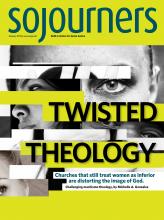THE DOMINANT cultures of North America have long struggled to take responsibility for the suffering and injustice inflicted upon the Indigenous Peoples of the continent. The archetypal “us/them” story of cowboys and Indians remains at the core of North American national identities, from derogatory sports mascots and symbols such as the Washington “Redskins” and the “Chief Wahoo” character of the Cleveland Indians to the ignorant “redfacing” by non-Indigenous partygoers and trick-or-treaters in contrived Indian outfits. And this situation is nowhere near ending, despite many years of cultural sensitivity training and education.
Such overt racism should never be acceptable today. Yet it persists in regard to Indigenous Peoples. Why is this? As one friend remarked to me, most modern-day Americans believe injustices done to Indigenous Peoples to be a thing of the past.
But are they? Steve Heinrichs, director of Indigenous relations for the Mennonite Church in Canada, has brought together nearly 40 theologians, activists, writers, and poets—half of whom are Indigenous—to create Buffalo Shout, Salmon Cry: Conversations on Creation, Land Justice, and Life Together, a challenging anthology on Indigenous-Christian relations, stolen land, racism, and the impending environmental crisis that we all must face together.
Read the Full Article
